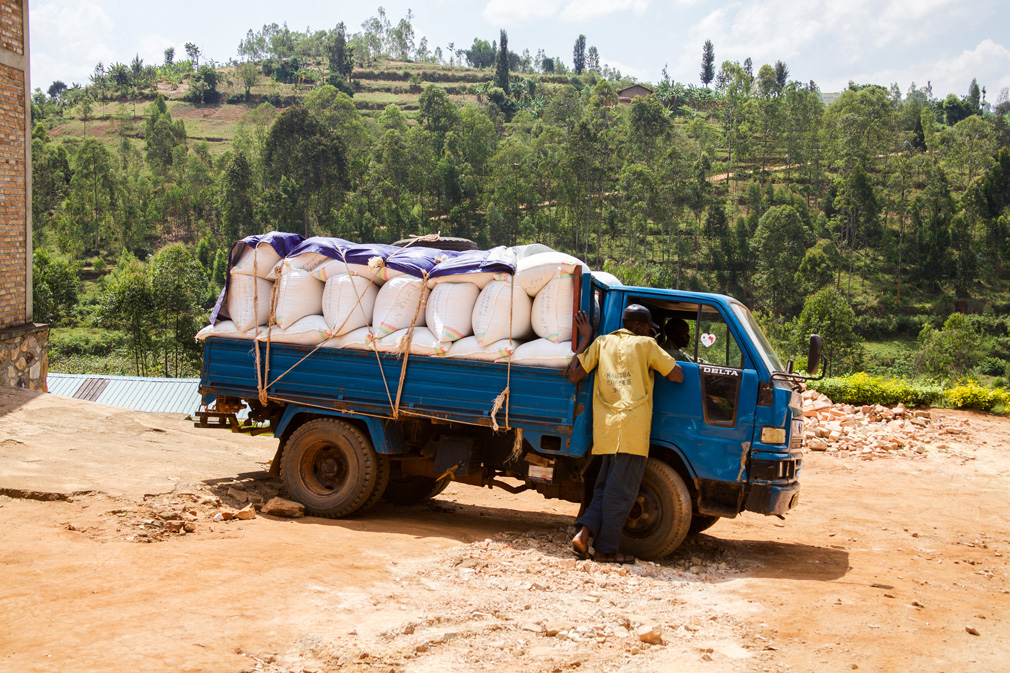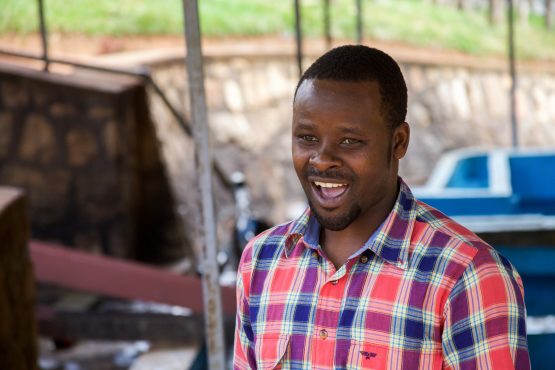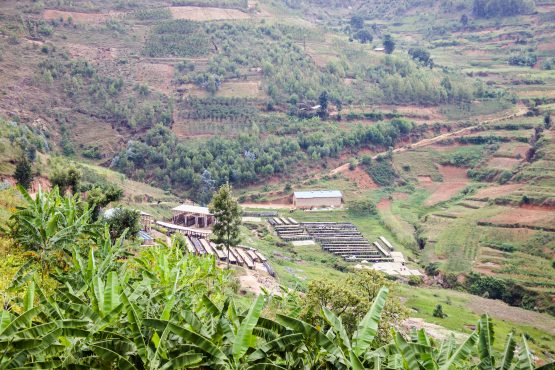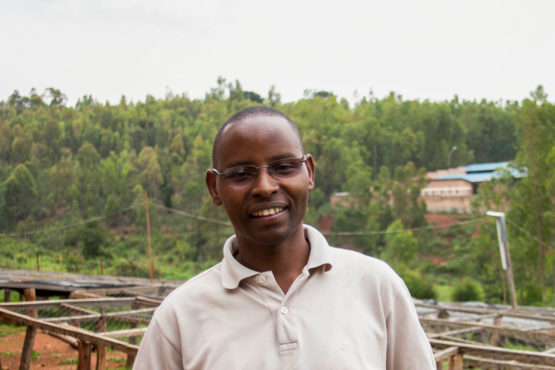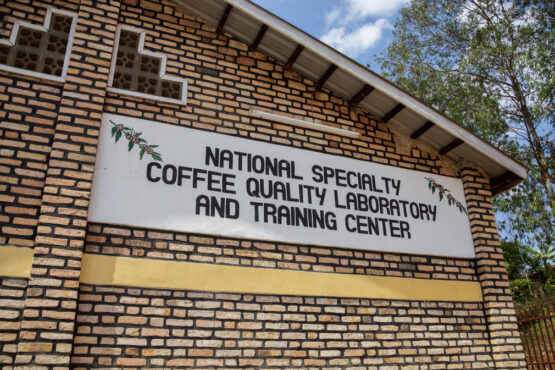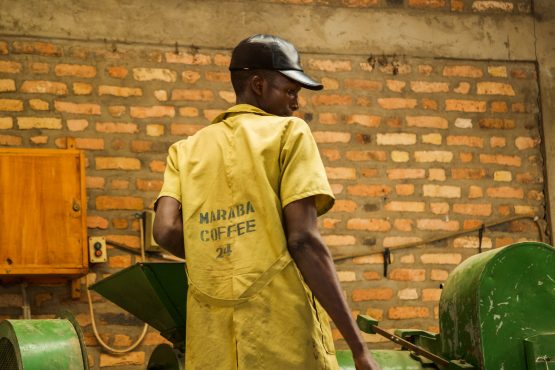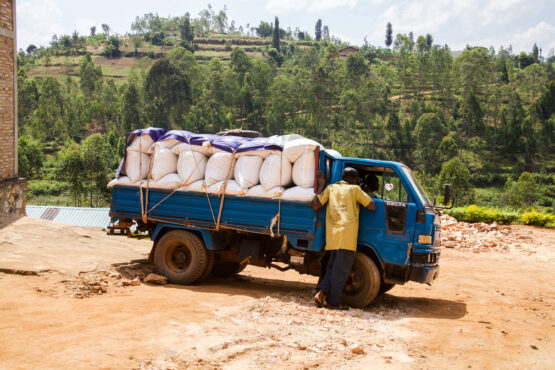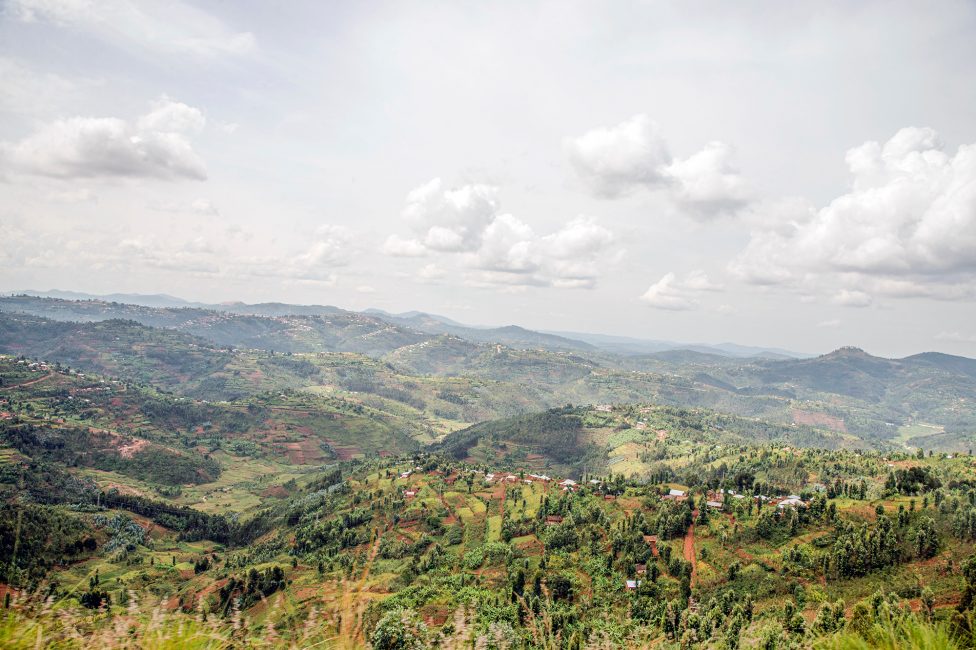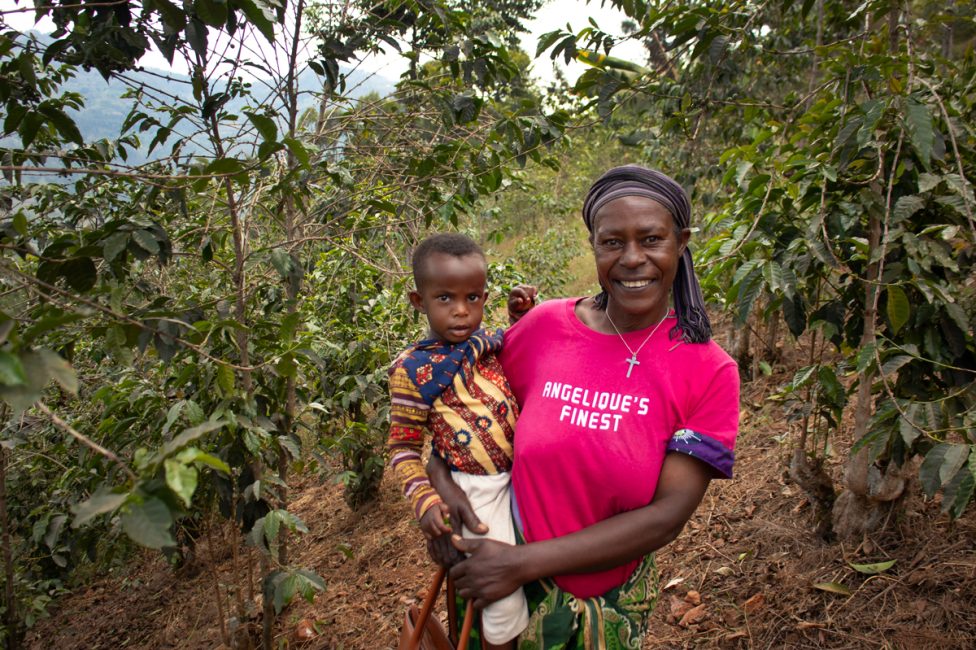Maraba Sovu Nyakagezi
Dark chocolate, cola and grapefruit, with a syrupy body and long black tea finish. Great balance and structure.
This 1,200kg micro-lot was produced by 48 smallholder coffee producers, who farm in the hills surrounding Sovu washing station, located in the Huye Sector of Huye District, in Rwanda’s Southern Province. The farmers are members of Nyakagezi Farmers’ Group, which is a smaller association within the Abahuzamugambi Ba Kawa Maraba Cooperative (or ‘Maraba’), who own and manage Sovu along with three other washing stations.
Most washing stations in Rwanda receive cherry from hundreds (and sometimes thousands) of farmers who own very small plots of land. Separation of such tiny lots is expensive and impractical, so the large majority of coffees are processed as a mixed lot from multiple producers. Typically, lots are separated as day lots (ie. cherries that were all picked on the same day) rather than by a single farm or producer group.
The farmers who make up the Nyakagezi group come from a nearby village called Nyarunazi. Recently they banded together and made the decision to process and market their coffees separately as a smaller, more selected lot. The group also provide each other with invaluable support, by sharing resources and labour during the busy harvest period.
They named their association Nyakagezi, which means ‘water source’ in the local Kinyarwanda language.
To distinguish their coffee and ensure it is processed separately, the producers have organised to deliver cherry to the washing station on certain days of the week. Selling their coffee as a separate lot allows them to directly benefit from any higher prices paid specifically for their coffees (rather than these profits being shared equally amongst all members) and results in a higher income to support their families. This creates an effective incentive for the farmers to work as a collective towards achieving the very best quality, and we think the results are evident in the complex and clean profile of their coffee!
ABOUT SOVU WASHING STATION
This coffee was processed at Sovu washing station, which was established in 2005 and is the smallest of Maraba’s washing stations, servicing about 420 cooperative members who farm locally. The washing station sits in the high, rugged mountains of Rwanda’s Southern Province. Quality control and day to day operations are overseen by Remy Haganje, who is supported by the Head of Quality Control, Christine Ilibagiza.
The cooperative has recently upgraded cherry sorting equipment and a water treatment facilities at each of their washing stations. They have also constructed a warehouse, where the coffee is safely stored before being transported to Kigali for final stages of milling and preparation for export.
Maraba, and specifically the Sovu washing station, has consistently been recognized for quality including numerous Cup of Excellence awards in 2008, 2011, 2012, 2013, and 2015. This is no small accomplishment, and this year’s offering is right up with these exceptional lots.
The area around Sovu washing station has ideal growing conditions for high-quality coffee, with high elevations, good rainfall and steady, cool temperatures year round. The farms that deliver to Sovu are situated around 1,800 meters above sea level. Coffee is grown as a cash crop, alongside subsistence food crops like maize, beans and sorghum and some livestock like goats and chickens. Cows are also an important asset to a farming family. Besides having practical advantages – like providing milk and yoghurt to feed the family, producing excellent manure for the coffee farms, and being an opportunity for additional income – they are also a traditional symbol of wealth and status in Rwanda.
ABOUT ABAHUZAMUGAMBI BA KAWA MARABA COOPERATIVE
In the local Kinyarwanda language, ‘Abahuzamugambi Ba Kawa’ means ‘Together we work the coffee’. The name is very fitting; established in 2001, Abahuzamugambi Ba Kawa Maraba Cooperative (or Maraba) was one of the first cooperatives to be formed in the wake of the devastating 1994 genocide. It was formed with the purpose of increasing the revenue that members received for their coffee by selling coffee directly to exporters in Kigali, rather than through an intermediary agent. As it has evolved it has become a symbol of hope and progress in the coffee sector and community and inspired the formation of many other specialty-focused cooperatives and coffee companies. Many leaders in the specialty coffee community in Rwanda started their careers at Maraba, including Ephiphanie of Buf Coffee.
In 2001 Maraba was the first cooperative to build a washing station, Cyarumbo, in Rwanda, which was set up as a model operation, with every stage of production considered and established in the best possible way. Now, the cooperative owns and operates four washing stations in the Southern Province’s Huye and Nyamagabe districts; Kibingo, Kabuye, Cyarumbo and Sovu. These centralised washing stations allow farmer members to process and dry their coffee with meticulous care and attention, and to fulfil the potential for quality of the coffees that they grow.
By becoming members of Maraba, these farmers are able to process their cherries centrally and combine their small, individual harvest into volumes that are large enough for export.
Since its formation, the cooperative has grown to encompass various communities of coffee growers in the Huye District. Initially founded by just 220 growers, Maraba has grown to 1,469 members. The cooperative is member-owned, and its profits are divided between members or reinvested into shared infrastructure, resources and training.
In an effort to continuously assist members to improve the yield and quality of their coffees, the cooperative provides agronomy training and access to discounted fertilisers and organic pesticides. Members are also given access to a number of services, including financial support for school fees and health services and loan facilities for home loans and farming equipment.
HOW COFFEE AT MARABA SOVU WASHING STATION IS PROCESSED
The team at Sovu Washing Station take a huge amount of care in sorting and processing their coffee. They own their own dry mill which enables them to control quality all the way through to export.
- Cherries are delivered to the washing station on the same day as they are picked and are inspected and sorted to ensure only the very ripest cherries are processed. They are then put into a floatation tank and sorted by weight (and any floaters removed) and pulped on the same day—almost always in the evening—using a mechanical pulper that divides the beans by weight (the heaviest usually being the best).
- After pulping, the coffee is fermented overnight for around 12–18 hours and then graded again using floatation channels that sort the coffee by weight. The beans are then soaked for a further 24 hours before being moved to raised screens for ‘wet-sorting’ by hand. All water used during the processing comes from a natural spring with water from the mountains.
- As with most washing stations in Rwanda, women do the majority of hand-sorting. This takes place in two stages—on the covered pre-drying tables and on the drying tables. Washed beans are moved from the wet fermentation tanks onto the pre-drying tables, where they are intensively sorted under shade for around six hours. The idea is that green (unripe) beans are still visible when they are damp, while the roofs over the tables protect the beans from the direct sunlight.
- Next, the beans are moved onto the washing station’s extensive raised drying tables (‘African Beds’) for around two weeks, where they are sorted again for defects, turned regularly and protected from rain and the midday sun by covers, ensuring both even drying and the removal of any damaged or defective beans. During this period, the coffee is also turned several times a day by hand to ensure the coffee dries evenly and consistently.
- After reaching 11% humidity, the coffee is stored in parchment and then when adequately rested it is carefully dry milled at the cooperative’s brand new dry mill.
WHY WE LOVE IT
Coffees from Huye District are characterised by heavy sweetness and juicy character. We’re excited to purchase coffee from Nyakagezi Farmers’ Group for the first time and to support the farmers of Kigarama Village. We love this coffee for its distinct flavour profile, with greengage plum, thyme and toasted almond in the cup.
